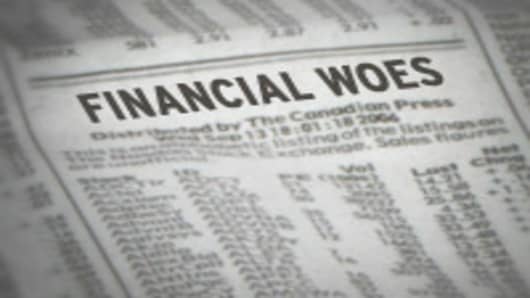The collapse of Australian investment firm Allco Finance Group could signal a wave of similar fates for those Australian companies that have relied on cheap debt for funding, analysts said.
Allco appointed administrators on Tuesday after failing to refinance A$147 million ($98 million) of debt, a victim of soaring credit costs amid the worst global financial crisis since the Great Depression.
Companies from shopping mall owner Centro Properties to investment fund Babcock & Brown and childcare centre operator ABC Learning Centres have run into trouble as the global crunch cut off funding avenues.
"Very cheap money got them to do what they did and falling asset values are the problem," said Mark Adams, managing director and head of debt capital markets at BNP Paribas in Hong
Kong. The number of companies grappling with debt problems is growing as the crunch bites.
Centro Properties, which used debt to pay for a rapid expansion into the United States, is selling assets to help pay down debt, but has had trouble finding buyers for some assets.
Investment fund Babcock & Brown Infrastructure, managed by Babcock & Brown, said on Wednesday it would suspend distributions on securities to preserve its cash flow.
Another highly-geared firm, financial services company Octaviar, formerly known as MFS Ltd, went into administration in September.
ABC Learning meanwhile has been unable to produce its financial results. The Australian Financial Review newspaper said on Wednesday, without citing sources, that the board is
considering administration.
More From CNBC.com ...
- The New Investment World: Together and Separate
- Australia Slashes Growth, Surplus Forecasts
- World Recession Gloom Builds, Australia Cuts Rates
As the outlook for Australia's economy darkens -- the government on Wednesday slashed its growth and budget surplus forecasts for the next three years due to a looming global recession -- more Australian companies could find themselves in trouble, analysts said.
"I don't expect new names from the top 25 largest firms by market capitalization, but perhaps from smaller companies like property developers and retailers," said Craig Saalmann, credit
strategist at JPMorgan.
Still, Australia's tradition of prudent lending and tough regulation mean its troubles pale in comparison with the United States. Standard & Poor's listed last month 140 large U.S. companies that were in danger of default, up twofold from the start of the year.
"Corporate Australia is reasonably conservatively geared across the board, except for the Allcos of this world," said Paul Dowling, principal analyst at Sydney-based banking research firm East & Partners.


